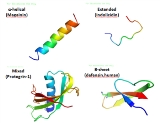
Antimicrobial peptides
Overview
Antibiotic
An antibacterial is a compound or substance that kills or slows down the growth of bacteria.The term is often used synonymously with the term antibiotic; today, however, with increased knowledge of the causative agents of various infectious diseases, antibiotic has come to denote a broader range of...
s which demonstrate potential as novel therapeutic agents. Antimicrobial peptides have been demonstrated to kill Gram negative and Gram positive bacteria (including strains that are resistant to conventional antibiotics), mycobacteria
Mycobacterium
Mycobacterium is a genus of Actinobacteria, given its own family, the Mycobacteriaceae. The genus includes pathogens known to cause serious diseases in mammals, including tuberculosis and leprosy...
(including Mycobacterium tuberculosis
Mycobacterium tuberculosis
Mycobacterium tuberculosis is a pathogenic bacterial species in the genus Mycobacterium and the causative agent of most cases of tuberculosis . First discovered in 1882 by Robert Koch, M...
), enveloped viruses, fungi and even transformed or cancerous cells.
Unanswered Questions

